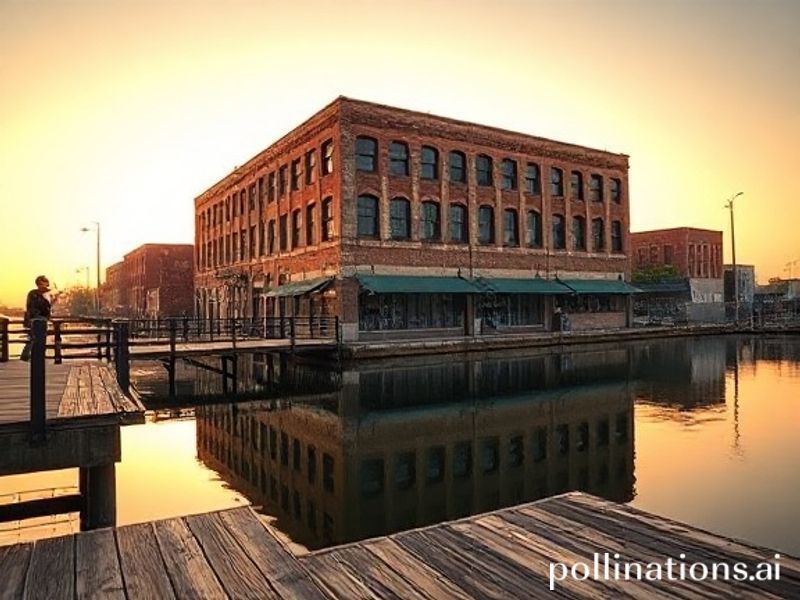Stockton: The Tiny City Teaching the World How to Fail Spectacularly—and Profitably
Stockton-on-Tees, California, or the Concept: Pick Your Poison
By our roaming correspondent who once confused the two and still hasn’t emotionally recovered
If the planet were a pub, Stockton would be the sticky table in the corner where empires go to sober up. The name itself is a global Rorschach test: say it in London and bankers picture rust-belt foreclosures; whisper it in Singapore and logistics wonks salivate over port throughput; mention it in Abu Dhabi and sovereign-wealth fund managers suddenly remember urgent calls. Each hallucination is partly true, mostly delusional, and entirely on-brand for late-stage capitalism’s greatest hits compilation.
Let’s begin with Stockton, California—birthplace of the Fantastic Four (the bankruptcy, not the superheroes). In 2012 it became the largest U.S. city to file for Chapter 9, a municipal ritual as American as supersizing a coronary. The international bond markets barely shrugged; after all, Greece had already set the bar for melodramatic sovereign meltdowns. Still, the filing rippled outward like a bad Yelp review: German Landesbanks discovered they’d bought parking-meter revenue bonds that paid in sunshine and broken dreams, while Japanese insurers quietly added “Central Valley real-estate exposure” to their list of things to pretend never happened. The upshot? A generation of European risk officers learned that municipal debt in the land of the free carries roughly the same safety rating as a chocolate teapot.
Meanwhile, 5,000 miles east, Stockton-on-Tees—England’s answer to the question “What if Leeds had an identity crisis?”—was busy exporting something subtler: the very notion of the passenger railway. The 1825 Stockton and Darlington line taught the world that moving people at speed was profitable, provided you didn’t mind the occasional boiler explosion or aristocrat splattered across the countryside. Today, Chinese engineers who can lay a kilometer of high-speed rail before breakfast still genuflect toward County Durham, mostly because the Party loves a historical narrative that ends in global domination via bullet train.
Then there is the conceptual Stockton: the archetype of post-industrial resilience marketed to Davos as “creative urban reinvention.” The city’s 2019 universal-basic-income pilot—$500 a month, no strings—was catnip to Scandinavian policy nerds and Silicon Valley philanthro-bros alike. Preliminary results (happier people, slightly fewer emergency-room visits) were hailed from Zurich think-tank panels to TEDx Reykjavik stages. Naturally, funding evaporated the moment venture capital realized you can’t IPO human dignity. Still, the experiment lingers in the global policy imagination like a pop song you hate but can’t un-hear, ensuring that every cash-strapped mayor from Lagos to Lima now has “Stockton-style UBI” in their pitch deck right next to the inevitable drone-delivery slide.
Shipping lanes add another layer of planetary punchline. The Port of Stockton—located improbably 75 miles inland—handles more almonds than existential dread, though the latter is catching up. When the Ever Given blocked Suez in 2021, commodity traders scrambled to reroute bulk carriers carrying Stockton-grown nuts to insatiable Asian snack factories. The lesson: even a city best known for fiscal slapstick can paralyze your bar-mix supply chain if the moon hits the tide just wrong. Somewhere, a hedge-fund algorithm now prices in “Stockton geopolitical risk,” proving that satire has given up and gone home.
Culture? Hollywood tried once—Cage and Cusack shot “The Frozen Ground” locally, a film memorable only for proving that tax credits can’t buy charisma. But Stockton’s real cultural export is cautionary: a masterclass in how to build a city on gold-rush optimism, agricultural subsidy, military pork, and the fervent belief that property values only rise. International observers take note: Dubai’s skyline may glitter, but so did Stockton’s promissory notes circa 2006.
So what does Stockton tell the world? That bankruptcy is just rebranding with worse catering. That a railway built to haul coal can end up hauling the dreams of 1.4 billion rail passengers a year. That universal basic income works until the photoshoot ends. And that, somewhere in the multiverse, an alien anthropologist is writing a thesis titled “Stockton: How to Fail Upward on a Species Level.”
In the end, whether you’re sipping bubble tea in Taipei or borscht in Minsk, Stockton is the reminder that every city is three bad decisions and one good buzzword away from becoming an adjective. Use it wisely—preferably in a sentence with “cautionary tale” and a nervous laugh.







